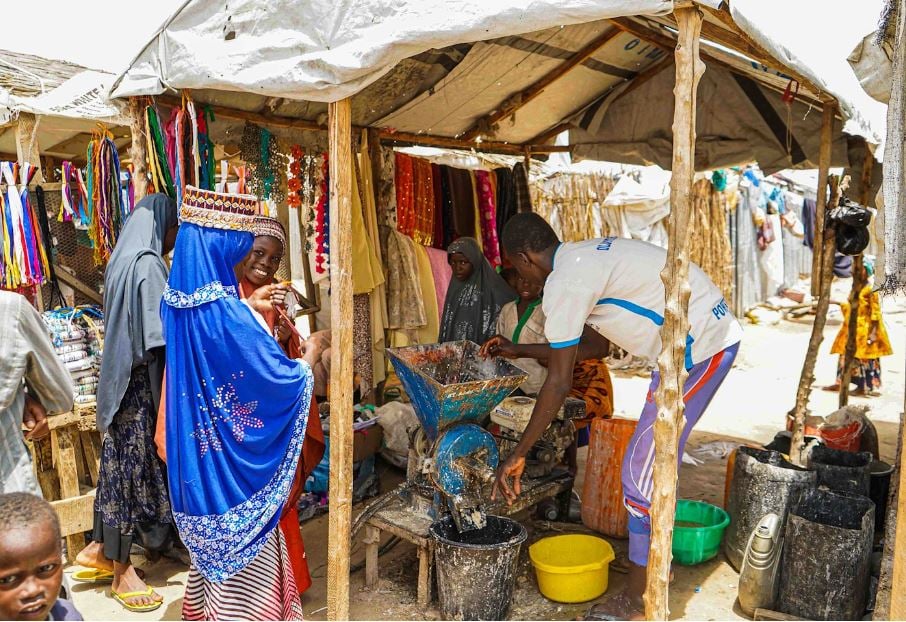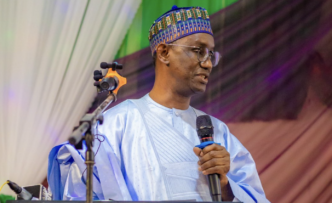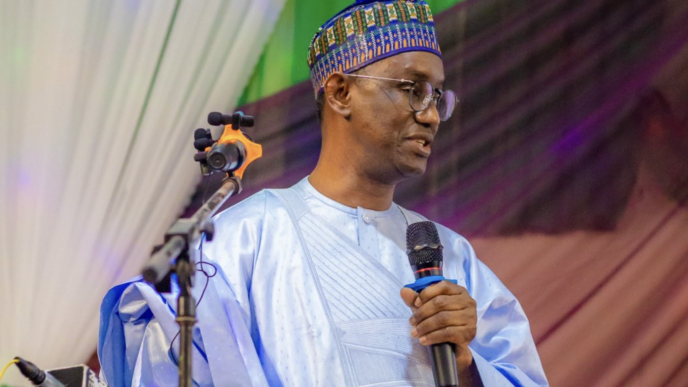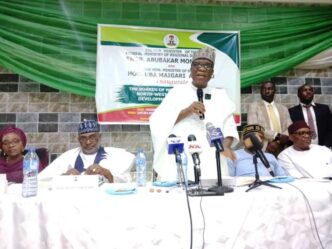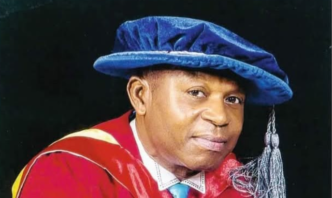I have a habit. Once in a while, I seek opportunities to experience and savour the northern heritage and culture in Lagos. For me, there is no other place to achieve this in Lagos than the grocery markets – you can bet to have a handful of my ‘people’ scattered everywhere in the market – bahaushes and bahaushiyas – very enterprising and resourceful. My occasional visits serve dual purposes: engage the glut of vendors at the market, most of whom are from the northern part of Nigeria, in Hausa language to sharpen my speaking skills having moved down south over two decades ago, and to gauge the mood of Nigerians about the economic situation as they troop to the market to shop.
On a particular sunny but breezy Sunday afternoon about five months ago, in one of my visits to a popular big grocery market in Lagos where the hustling and bustling typical of such a market was evident, I could not but observe a young couple – possibly in their mid-30s as they gestured and stared at each other (there was unmistakable chemistry and undeniable bond between them), as they approached a vendor I was talking with to also make inquiries about some groceries.
Once the prices were disclosed to them, I could visibly see that the doting on each other and the bond they felt for each other instantly took the back seat. The buzz of excitement seemed to have quickly disappeared. Worry and shock took over. The woman quipped, “Haha, what kind of a country is this for God’s sake?” The man, looking somewhat aghast, said, “My sunshine!” to which the woman replied, “My crown, I’m listening” and the man said, “They said they want to rebase the GDP, let’s wait and see what it would bring now”. Exasperated, the woman screamed, “What are you saying gan an? Will that put food on our table and pay the kids’ school fees ni?”
The rebasing exercise; necessary, credible, and helpful to any country is not a newly-fashioned economic idea. It is important to do because it paints a clearer, more recent picture of how much a country consumes and produces. Several countries have had their GDP recomputed at one time or the other as they deemed it fit which often leads to the reclassification of economies: low-middle-or-high-income economies as the case may be.
Advertisement
For Nigeria, things have changed since the last exercise – we all know. Interestingly, the GDP rebasing, which has caught so many headlines and described by some as a high-stake especially after the Nigerian Bureau for Statistics (NBS) issued a communique that the rebased GDP and CPI would be released to the public by the end of January 2025, is desirable to enable Nigeria remain a strategic economic player in the continent and compete effectively with others in the continent and elsewhere. As I pondered about the news coming from the NBS and the reactions it has generated, it immediately refreshed my memory and took my attention to the encounter I had with this lovely couple at the grocery market and I began to play back in my head, the short conversations which ensued between the couple.
This exercise is simply the process of updating economic metrics like GDP and CPI. This has been long overdue by all standards as the UN recommends it is done every five years – it baffles me why Nigeria hasn’t kept to this recommendation. It supports and improves decision-making because it enables the government and our economic handlers to describe the nation’s economy in the present term and not a decade ago – the last exercise was in 2014. We all know Nigeria has changed since then as so much has happened as far as the economy is concerned. New leads, no doubt, would have surfaced regarding several sectors that have evolved or that were overlooked in the previous exercise.
The beauty of the rebasing exercise is that the potential of those economic sectors or industries that were non-existent or considered inactive during the last exercise but has now evolved substantially, would now be assessed and the contributions factored into the overall equation of the nation’s economy. Previously unaccounted or uncounted booming sectors like the marine economy, digital economy, creative economy, etc, many of which were probably in their formative stages ten years ago set the tone on what to expect in this rebasing exercise.
Advertisement
Expectedly, because more sectors are likely to be contributing to the economy now than they were a decade ago, the GDP is likely to be larger and bigger than it currently is. However, it is important to highlight that with an improved GDP, tax-to-GDP, just like the debt-to-GDP, would almost certainly drop. This is because the total tax revenues accruing to the federation account at the current tax-to-GDP ratio of 10 percent based on the current size of our economy would be smaller relative to a higher GDP.
With efficient tax laws and administration nonetheless, more revenues from taxes should accrue to the government’s account. On its part, a drop in the debt-to-GDP would provide fiscal space and sustainability which enhances spending choices for government and aids the provision of resources for certain public commitments necessary to achieve the objectives of government.
This said, because a lower debt-to-GDP with improved GDP after rebasing could be likened to a company that suddenly has more money in its bank account in comparison to the amount the company has borrowed giving the company the freedom to borrow more money, Nigerians hope that should the nation’s debt policy be changed as a result of a rebased GDP, all future borrowings would be deployed to self-liquidating infrastructural projects to enhance the living conditions of Nigerians and not to create a windpipe to further fund corruption.
‘It’s a goal……..’, is a popular shout you hear renting the air from every corner all over Nigeria on a typical Saturday evening to break a deadlock and pervasive silence engulfing everywhere when the national football team of Nigeria scores a decisive goal in a thrilling and competitive match against one of her arch-rivals.
Advertisement
What I hear some experts say about the anticipated rebasing exercise, which for all intents and purposes should boost investors’ confidence and make our country more attractive for investments, jerk up our GDP based on the outcomes of past exercises – unclear to what degree though, is akin to a winning team hollering with shouts of jubilation as if the decisive goal needed to enable it to lift a long-awaited trophy has been scored.
For some experts, it is as if the rebasing would become a stand-in for automatic improvements in the economic status of several Nigerians, especially those with whom what it means to live the ‘Nigerian Dream’ has been reduced to what they have read about and of how some of our current political leaders had the rare privilege to live it years ago.
Furthermore, the rebasing could be labelled as a paradox of realities because in spite of the likely increase in the size of our economy after its conclusion, abject poverty at a scale never seen before may persist – or even grow worse. For several Nigerians from all works of life, it is not yet Uhuru. This would not immediately translate to more money in the pockets of so many struggling Nigerians. It may have a positive outlook on the image of Nigeria – and it certainly does, for Nigerians, the journey ahead is still laced with so much anxiety as it doesn’t stop the agitations and the constant steering into the ceilings due to so many unmet needs and utility bills getting out of reach due to prices of goods and services more or less quadrupled in some cases and incomes have not seen any significant shifts.
As a matter of fact, the renowned economist and Chief Executive Officer, of Financial Derivatives Limited; Bismark Rewane, while noting that, with rebasing, foreign investors can understand better the size and components of our economy, was quoted by Nairametrics after the 2014 rebasing exercise which rebased the nation’s GDP to $510 billion, that: “The GDP is an output measure and should not be misconstrued as a revenue measure in view of the way some analysts are commenting on it”. He said further, “There was really nothing much to be excited about because it had not in any way improved the life of the common man….it has not increased the amount of money in people’s accounts, there has not been more jobs and the prices of goods and services have not changed”.
Advertisement
I want to believe this position held by Rewane in 2014 will not be radically different from what to expect on the soon-to-be-released rebased GDP and CPI. The money in Nigerians’ wallets would not double, the dearth of infrastructure especially in power generation, and quality road and rail network would not be fixed overnight, unemployment and inflation rates crashing to the barest minimum may still be wishful thinking at best, etc.
The last thing well-meaning Nigerians would expect of this rebasing exercise is for it to be politicised. With the economy expected to expand, it is hoped that the government’s intention would not be to use the new economic metrics to push rhetoric that would suggest the economy is in perfect shape and doing brilliantly when, in fact, ordinary Nigerians, who are ready to call out this hypocrisy if it ever occurs, aren’t feeling in their wallets, the impact of good governance and the renewed hope promised by this administration just yet. I must mention that hunger and poverty are not partisan issues – not at all by any stretch. They ravage vulnerable Nigerians in their numbers regardless of political or ethnic inclinations.
Advertisement
It is, therefore, a clarion call for the political class to stop politicising these social issues that are undermining the mental health of so many people and denting our national honour, and join hands to provide bipartisan support to move this nation urgently forward. By no means can we say the Tinubu administration is perfect – they don’t even come close, but Nigerians are not asking for a perfect government. Nigerians just want an honest and transparent government. Unfortunately, it appears ironic that the hungrier and poverty-stricken Nigerians grow with the passing day, the more our nation runs up government spending and debts, pushing us further and further away from realising the inherent enormous potential of the country and the ideals of our founding fathers.
In light of the crushing economic realities, Nigerians, many of whom are committed to a very high standard of patriotism, dedication, and loyalty, have been making adjustments in their lifestyles in order to cope with the nation’s current realities. They hope that the government and its officials would articulate responsible measures to hold themselves to the same standards by being good stewards of every single tax-payer naira that accrues to our purses – nationally and sub-nationally.
Advertisement
The painful reality is that if the country does not deal with the social, bureaucratic, structural, and systemic issues bedevilling us and the inefficiencies clogging the wheels of governance, like immediately fixing the inadequacy in the country’s infrastructure, address the myriad of setbacks in our foreign exchange portfolio to enable the monetary policy handlers to enhance its capacity to stem the continuous slide of the naira and deal with the raging blight of insecurity in the nation aptly described by Professor Babafemi Badejo as being reduced to one thousand naira, “A country where security is an afterthought, where leadership is so corrupt, and where roads are made safe only for those in power. For the rest of us, survival has become a matter of luck and, sometimes, a thousand naira (One Thousand Naira nicknamed by Agberos in Lagos) compulsory gift for “freedom””. For most, there is no way the lives of ordinary and struggling Nigerians – artisans, market men, and women, etc, who are uninterested and oblivious of any GDP rebasing, would be improved.
In conclusion, many professionals like the young couple I encountered at the grocery market, the man whom I later came to know is an Economist, are not fully sold on the positive effects this rebasing exercise would have on their wellbeing and the possibility of easing their economic pressures which have assumed an unprecedented dimension and left a trail of separation, depression, hunger and poverty on the lives of many. It is now common that the evenings of so many couples are disturbed by what has now become a familiar sound; the sounds of hunger from their children each time they are about to turn in for the evening which leads to a period of gloom for them. They are hopelessly keeping hope alive that the worst and steadily worsening cost of living crisis they have had to deal with in about three decades or so would soon be fixed or at least, show some flicker of light in the distant future to suggest there are chances for improvements beyond the visible government profligacy.
Advertisement
Ande, a financial and political economy analyst, writes from Lagos and can be reached via [email protected]
Views expressed by contributors are strictly personal and not of TheCable.
Add a comment

